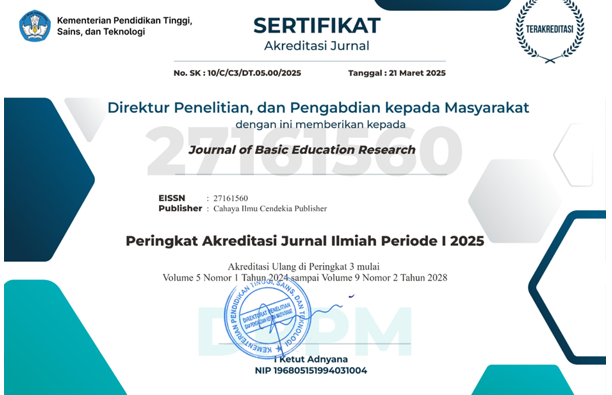The Influence of the School Environment on the Formation of Children's Character
Abstract
Purpose of the study: This study investigates the influence of the school environment on the formation of children’s character within the context of Civics subjects at South Galesong District, Takalar Regency. By employing a descriptive qualitative research design, the study examines the interplay of various factors educators, students, canteens, classrooms, and playing fields in shaping character development. Two informants, selected for their knowledge and insights, contribute valuable perspectives to the research.
Methodology: The research design is descriptive and qualitative. The sample comprises class V students, and the study involves two informants who possess relevant knowledge regarding the influence of the school environment on character formation. Data collection methods include observation, documentation, and in-depth interviews. Qualitative analysis is applied to the collected data.
Main Findings: The study reveals nuanced insights into the Influence of the School Environment on the Formation of Children’s Character. Interviews with informants highlight both positive and negative influences. Educators play a crucial role, impacting character development through their teaching methods and interactions. Similarly, students’ behavior and peer dynamics significantly contribute to character formation. Surprisingly, even seemingly mundane aspects such as canteens and playing fields influence children’s values and attitudes.
Novelty/Originality of this study: This research contributes novel insights by emphasizing the pivotal role of the school environment in character formation. By providing practical recommendations, it aims to empower elementary school 77 Kanaeng and other educational institutions to cultivate resilient, compassionate, and morally grounded individuals—the bedrock of a thriving Indonesian society.
References
D. Muchtar and A. Suryani, “Pendidikan Karakter Menurut Kemendikbud,” Edumaspul J. Pendidik., vol. 3, no. 2, pp. 50–57, 2019, doi: 10.33487/edumaspul.v3i2.142.
S. Khofifah, “Pengaruh Lingkungan Sekolah Terhadap Pembentukan Karakter Anak Di Sekolah Dasar,” TA”LIM J. Multidisiplin Ilmu, vol. 1, no. 2, pp. 59–65, 2022, doi: 10.38048/jipcb.v10i2.1333.
W. Wahyudin, “Optimalisasi Peran Kepala Sekolah dalam Implementasi Kurikulum 2013,” J. Kependidikan, vol. 6, no. 2, pp. 249–265, 2018, doi: 10.24090/jk.v6i2.1932.
A. Agustan Arifin, “Komunikasi Efektif Dalam Penguatan Karakter Peserta Didik,” Pros. Semin. Nas. Pendidik. Guru Sekol. Dasar, vol. 1, no. 1, pp. 89–100, 2021, doi: 10.25134/prosidingsemnaspgsd.v1i1.16.
R. H. Mardhiyah, S. N. F. Aldriani, F. Chitta, and M. R. Zulfikar, “Pentingnya Keterampilan Belajar di Abad 21 sebagai Tuntutan dalam Pengembangan Sumber Daya Manusia,” Lect. J. Pendidik., vol. 12, no. 1, pp. 29–40, 2021.
E. Istiyono, B. Kartowagiran, H. Retnawati, H. C. A. Kistoro, and H. Putranta, “Effective Teachers' Personality in Strengthening Character Education,” International Journal of Evaluation and Research in Education, vol. 10, no. 2, pp. 512-521, 2021, doi: 10.11591/ijere.v10i2.21629.
E. Khaidir, and F. M. Suud, “Islamic education in forming students' characters at as-shofa Islamic High School, pekanbaru Riau,” International Journal of Islamic Educational Psychology, vol. 1, no. 1, pp. 50-63, 2020, doi: 10.18196/ijiep.1105.
F. T. Aldila and E. F. S. Rini, “Teacher’s Strategy in Developing Practical Values of the 5th Pancasila Precepts in Thematic Learning in Elementary School”, J. Bs. Edu. R, vol. 4, no. 1, pp. 31-38, 2023, doi: 10.37251/jber.v4i1.301
J. Wahono, I. Kusumawati, and A. N. A. Bowo, “Developing Pancasila and Citizenship Education Learning Model Based on Character Education Through Comprehensive Approach,” International Journal of Educational Management and Innovation, vol. 2, no. 2, pp. 228-240, 2021, doi: 10.12928/ijemi.v2i2.3239.
S. Sosiden, and P, Viraek, “Character Development of Students through Extracurricular Activities,” Journal La Edusci, vol. 2, no. 6, pp. 1-6, 2021, doi: 10.37899/journallaedusci.v2i6.526.
A. Zakso, I. Agung, E. Sofyatiningrum, and M. C. Capnary, “Factors affecting character education in the development of the profile of Pancasila students: The case of Indonesia,” Journal of Positive School Psychology, vol. 6, no. 2, pp. 2254-2273, 2022.
S. Nurafiati, T. Rahayu, and H. P. Sugiharto, “Strategy for Strengthening Character Education in Physical Education Learning at Makassar City Elementary Education Level,” Journal of Hunan University Natural Sciences, vol. 48, no. 6, 2021.
W. D. Pahlawanti, E. Harapan, and D. Wardiah, “The Influence of School Principal Supervision and School Committee Participation on the Quality of Junior High School Education,” International Journal of Progressive Sciences and Technologies, vol. 23, no. 1, pp. 324-333, 2020, doi: 10.52155/ijpsat.v23.1.2260.
N. Nurhayati, J. Jamaris, and S. Marsidin, “Strengthening Pancasila Student Profiles In Independent Learning Curriculum In Elementary School”, IJHESS, vol. 1, no. 6, 2022, doi: 10.55227/ijhess.v1i6.183.
S. P. Kawuryan, S. A. Sayuti, and S. I. A. Dwiningrum, “Teachers Quality and Educational Equality Achievements in Indonesia,” International Journal of Instruction, vol. 14, no. 2, pp. 811-830, 2021, doi: 10.29333/iji.2021.14245a.
Y. Pratikno, E. Hermawan, and A. L. Arifin, “Human resource ‘Kurikulum Merdeka’from design to implementation in the school: What worked and what not in Indonesian education,” Jurnal Iqra': Kajian Ilmu Pendidikan, vol. 7, no. 1, pp. 326-343, 2022, doi: 10.25217/ji.v7i1.1708.
J. M. Timm, and M. Barth, “Making education for sustainable development happen in elementary schools: The role of teachers,” Environmental Education Research, vol. 27, no. 1, pp. 50-66, 2021, doi: 10.1080/13504622.2020.1813256.
N. Pacaol, “Teacher's Workload Intensification: A Qualitative Case Study of Its Implications on Teaching Quality,” International Online Journal of Education and Teaching, vol. 8, no. 1, pp. 43-60, 2021.
S. H. Ham, W. Liao, and Y. Zhou, “Towards a school culture of pedagogical fairness: revisiting the academic performance of immigrant children in East Asia,” International Journal of Inclusive Education, pp. 1-18, 2022, doi: 10.1080/13603116.2022.2085818.
E. Zavelevsky, O. Shapira-Lishchinsky, P. Benoliel, J. Klein, and C. Schechter, “Ecological school culture for novice teachers’ retention: Principals’ perceptions,” Leadership and Policy in Schools, vol. 21, no. 4, pp. 922-937, 2022, doi: 10.1080/15700763.2021.1879170.
D. Gan, and I. Alkaher, “School staff perceptions on education for sustainability and sense of community as reflected in an elementary school culture in Israel,” Environmental Education Research, vol. 27, no. 6, pp. 821-847, 2021, doi: 10.1080/13504622.2021.1892030
J. Jabbari, and G. Duncan, “Forming ‘men for others’: a phenomenological case study on the intersection of school culture and at-risk males,” International Studies in Catholic Education, pp. 1-19, 2021, doi: 10.1080/19422539.2020.1858637
K. I. Rosadi, “The effect of emotional intelligence, spiritual intelligence, and school culture on strengthening senior high school student’s character in Jambi Province,” Cogent Social Sciences, vol. 9, no. 1, 2023, doi: 10.1080/23311886.2023.2194564
B. Y. Tabak, and E. Karip, “Democratic school culture: Investigating an educational practice of democracy in schools a study on democratic citizenship and human rights education project in Turkey,” Leadership and Policy in Schools, vol. 21, no. 4, pp. 856-875, 2022, doi: 10.1080/15700763.2020.1866019.
D. Wibowo, “The role of school culture in teacher professional development for peace education: the case of Sukma Bangsa School Pidie in post-conflict Aceh, Indonesia,” Journal of Peace Education, vol. 19, no. 2, pp. 182-204, 2022, doi: 10.1080/17400201.2021.2015573
A. R. Casmana, J. A. Dewantara, D. A. Timoera, A. P. Kusmawati, and I. Syafrudin, “Global citizenship: preparing the younger generation to possess pro-environment behavior, mutual assistance and tolerance awareness through school engagement,” Globalisation, Societies and Education, vol. 21, no. 1, pp. 15-32, 2023, doi: 10.1080/14767724.2021.2013167
L. Oestreich, T. B. Torres, and A. Ruiz-Padillo, “Fuzzy analysis of students’ perception of traffic safety in school environments: the case of a small Brazilian city,” International journal of injury control and safety promotion, vol. 28, no. 2, pp. 255-265, 2021, doi: 10.1080/17457300.2021.1909625
M. C. Us, and Y. O. Us, “Evaluation of the relationship between sleep bruxism and sleeping habits in school-aged children,” CRANIO®, vol. 41, no. 6, pp. 569-577, 2023, doi: 10.1080/08869634.2021.1890454
L. Heidelberger, and E. Bronk, “Dietary Habits of Pre-schoolers Living in Rural, Low-income Households in Wisconsin: A Pilot Study,” Journal of Hunger & Environmental Nutrition, vol. 16, no. 4, pp. 553-570, 2021, doi: 10.1080/19320248.2020.1765937
S. A. Koohpayeh, P. Vasli, C. Rohani, and M. Nasiri, “Comparison of the effects of applying problem-based learning and lecture-based learning on menstrual hygiene behaviors and food habits of adolescent girls in Iran,” International Journal of Health Promotion and Education, pp. 1-17, 2022, doi: 10.1080/14635240.2022.2075427
M. Hernández and A. Carrasco, “The transition from a deregulated market to a centralised school admission system in Chile: Mapping middle-class responses to new school choice rules,” Compare: A Journal of Comparative and International Education, vol. 52, no. 7, pp. 1107-1124, 2022, doi: 10.1080/03057925.2020.1851592
F. Kaysi, “Mobile instant messaging application habits among university students,” Interactive Learning Environment, vol. 31, no. 5, 2021, doi: 10.1080/10494820.2021.1922460
F. Svartdal, R. G. Sæle, T. I. Dahl, E. Nemtcan, and T. Gamst-Klaussen, “Study habits and procrastination: the role of academic self-efficacy,” Scandinavian Journal of Educational Research, vol. 66, no. 7, pp. 1141-1160, doi: 10.1080/00313831.2021.1959393
J. Nishikawa and J. Morita, “Cognitive model of phonological awareness focusing on errors and formation process through Shiritori,” Advance Robotics, vol. 34, no. 5, 2022, doi: 10.1080/01691864.2022.2029763
R. Curren, and R. M. Ryan, “Moral self-determination: The nature, existence, and formation of moral motivation,” Journal of Moral Education, vol. 49, no. 3, pp. 295-315, 2020, doi; 10.1080/03057240.2020.1793744.
Copyright (c) 2024 Abdul Azis, Sukma Utami, Lyn Cronin, Ahmad H. Al Sanie

This work is licensed under a Creative Commons Attribution-NonCommercial 4.0 International License.
Authors who publish with this journal agree to the following terms:
- Authors retain copyright and acknowledge that the Journal of Basic Education Research is the first publisher licensed under a Creative Commons Attribution 4.0 International License.
- Authors are able to enter into separate, additional contractual arrangements for the non-exclusive distribution of the journal's published version of the work (e.g., post it to an institutional repository or publish it in a book), with an acknowledgment of its initial publication in this journal.
- Authors are permitted and encouraged to post their work online (e.g., in institutional repositories or on their website) prior to and during the submission process, as it can lead to productive exchanges and earlier and greater citation of published work.





.png)


.png)
.png)


















